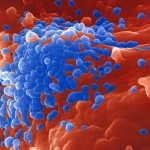Link to Pubmed [PMID] – 19291712
J. Pathol. 2009 May;218(1):48-56
Merkel cell carcinoma (MCC), a skin tumour with neuroendocrine features, was recently found to be associated with a new type of human polyomavirus, called Merkel cell virus (MCV). We investigated the specificity of this association as well as a causal role of MCV in oncogenesis. DNA and RNA from ten cases of MCC were analysed using PCR and RT-PCR. DNA from 1241 specimens of a wide range of human tumours was also analysed. The DIPS technique was used to identify the integration locus of viral DNA sequences. Array CGH was performed to analyse structural alterations of the cell genome. MCV DNA sequences were found in all ten cases of MCC and in none of the 1241 specimens of other tumour types. Clonal integration of MCV into the host genome was seen in all MCC cases and was checked by FISH in one case. A recurrent pattern of conserved viral sequences which encompassed the replication origin, the small tumour (ST), and the 5′ part of the large tumour (LT) antigen DNA sequences was observed. Both ST and LT viral sequences were found to be significantly expressed in all MCCs. Neither recurrent site of integration nor alteration of cellular genes located near the viral sequences was observed. The tight association of MCV with MCC, the clonal pattern of MCV integration, and the expression of the viral oncoproteins strongly support a causative role for MCV in the tumour process. This information will help the development of novel approaches for the assessment and therapy of MCC and biologically related tumours.

